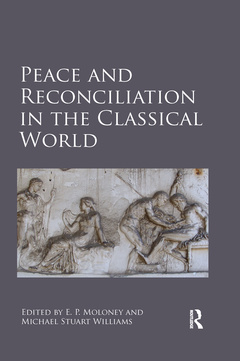Description
Peace and Reconciliation in the Classical World
Coordinators: Moloney E. P., Williams Michael Stuart
Language: English
Subject for Peace and Reconciliation in the Classical World:
Keywords
Hispania Ulterior; Koine Eirene; Classical antiquity; Arrius Antoninus; Ancient Greece; Perfect Passive Participle; Ancient Rome; Fasti Triumphales; Michael Stuart Williams; Hispania Citerior; William Allan; Neo-Assyrian Kings; Will Desmond; Interstate Peace; Ian Ruffell; Augustine’s Sermon; Benjamin Gray; Good Life; Hannah Cornwell; Sulpicius Severus; Myles Lavan; Donatist Bishop; David M; Gwynn; King’s Peace; Selga Medenieks; Common Peace; Aideen Carty; Civic Reconciliation; Andrew J; Bayliss; Sparta’s Allies; John Richardson; Young Men; John Curran; Verb Pacare; Christoph Ulf; Individual Arbiters; Janett Morgan; Nelson Mandela; Michael Edwards; Monumental Building; Joseph Jansen; Jupiter Optimus Maximus; P; Iver Kaufman; Emperor’s Son; Assyrian King; Christian Dialogues
Publication date: 06-2020
· 15.6x23.4 cm · Paperback
Publication date: 02-2017
· 15.6x23.4 cm · Hardback
Description
/li>Contents
/li>Readership
/li>Biography
/li>
Warfare has long been central to a proper understanding of ancient Greece and Rome, worlds where war was, as the philosopher Heraclitus observed, ?both king and father of all?. More recently, however, the understanding of Classical antiquity solely in such terms has been challenged; it is recognised that while war was pervasive, and a key concern in the narratives of ancient historians, a concomitant desire for peace was also constant. This volume places peace in the prime position as a panel of scholars stresses the importance of ?peace? as a positive concept in the ancient world (and not just the absence of, or necessarily even related to, war), and considers examples of conflict resolution, conciliation, and concession from Homer to Augustine. Comparing and contrasting theories and practice across different periods and regions, this collection highlights, first, the open and dynamic nature of peace, and then seeks to review a wide variety of initiatives from across the Classical world.
1 Introduction: Imagining, Establishing, and Instituting Peace
E. P. Moloney and Michael Stuart Williams
PART I IMAGINING PEACE IN THE ANCIENT WORLD
2 Solon the Peacemaker
William Allan
3 Aristotle on Peace: Biological, Political, Ethical, and Metaphysical Dimensions William Desmond
4 (What’s so Funny ’bout) Peace, Love, and Understanding? Imagining Peace in Greek Comedy
Ian Ruffell
5 Reconciliation in Later Classical and Post-Classical Greek Cities: a Question of Peace and Peacefulness?
Benjamin Gray
6 Negotiating Ideas of Peace in the Civic Conflicts of the late Republic
Hannah Cornwell
7 Peace and Empire: Pacare, Pacatus and the Language of Roman Imperialism
Myles Lavan
8 Blessed are the Peacemakers: Visions of Christian Peace from Christ to Constantine David M. Gwynn
PART II ESTABLISHING PEACE IN THE ANCIENT WORLD
9 Cyrus the Great: an Unconventional Peacemaker
Selga Medenieks
10 International Arbitration in Archaic Greece
Aideen Carty
11 Once an Ally, Always an Ally: Sparta’s Approach to Policing the Oaths of her Allies in the late-Fifth and early-Fourth Centuries
Andrew Bayliss
12 The Compromise of Kings: Philip II and Macedonian Peace
E. P. Moloney
13 Deditio in the Second Century BC: Subjugation and Reconciliation
John Richardson
14 How Wars End: Three Thoughts on the Fall of Jerusalem
John Curran
PART III INSTITUTING PEACE IN THE ANCIENT WORLD
15 Identity Building as a Means of Conflict Resolution, or: Thucydides’ Struggle with Hellenic Discourses
Christoph Ulf
16 Monuments to Victory and Symbols of Peace and Reconciliation? Re-viewing Post-War Building in Classical Athens and Achaemenid Persia
Janett Morgan
17 Peace and Reconciliation, Athenian-Style
M. J. Edwards
18 Beyond War, Imperialism, and Panhellenism: Xenophon’s Eirenic Thought
Joseph Jansen
19 Punishment and Reconciliation: Augustine
P. I. Kaufman
20 Reading Reconciliation in Late Antique Altercationes
Michael Stuart Williams
E. P. Moloney is Senior Lecturer in Classical Studies at the University of Winchester. Specializing in classical Greek culture and history, with a focus on ancient Macedon, Dr Moloney has published recently on the early history of that kingdom. Building on that work, a monograph on the cultured courts of the Argead kings is now near completion.
Michael Stuart Williams is lecturer in the Department of Ancient Classics at Maynooth University. His primary research interest is the intellectual history of Christianity, and he has published on ancient biography and hagiography in his book Authorised Lives in Early Christian Biography (2008). He has also edited two volumes under the title Unclassical Traditions (2010 and 2011). He is currently completing a book entitled The Politics of Heresy in Ambrose of Milan.




